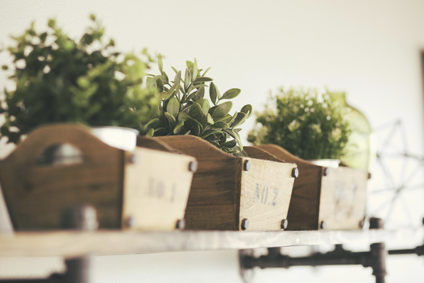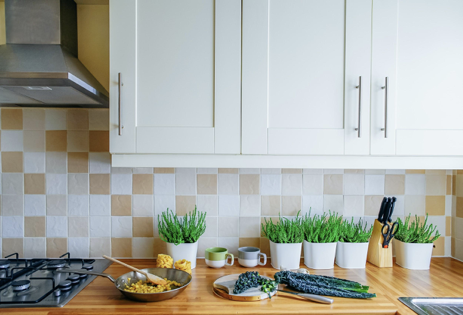
If you love fresh herbs but don’t have an outdoor space to grow them in, why don’t you take a shot at an indoor herb garden? You can grow healthy herbs indoors in your kitchen provide you have the right herbs, the right grow lights, the right containers, and the necessary indoor gardening tools. If you have the passion to grow your own herbs indoors, here is how to do it:
- Choose the right herbs
Not all herbs thrive in indoor environments, so you have to research which of your favorite herbs to try. Some of the herbs that many people grow indoors include:
• Basil: This herb does well indoors provided you place it close to a window or quality grow lights, use nutrient-rich soil, and water them regularly. They are arguably the easiest herbs to grow indoors.
• Mint: It grows well under a shade, but if you want it to really thrive, place it close to a light source; preferably hanging above the ground. Note that mint doesn’t mix well with other herbs so it should be grown alone.
• Oregano: With sufficient drainage, a little sunshine, and healthy soil, this herb will surpass all your expectations.
Note: If you cannot access a garden shop right now, don’t worry because you grow herbs from cuttings as well. All you need is a branch of an existing plant that is expertly cut at the node, soak it in water for it to grow new roots, and then plant it.
- Choose the right soil

Your choice of growing soil should be advised by the choice of herbs you made. But as a rule of thumb, you need to find soil that is peat-free, rich in nutrients, and organic. It should be peat-free because as much as it improves water retention abilities in soil, it isn’t a sustainable resource. Be sure to use a designated potting mix for containers. It allows for good drainage and will not compact over time.
- Choose the right container

You will be growing the herbs on your kitchen counter or hanging them from the kitchen ceiling, so you must choose a pot that complements your interior décor. If your current kitchen structure does not allow you to place the plants, you can install ready to assemble cabinets in the kitchen which will offer you multiple opportunities for hanging the plants. You can opt for metal, wood, clay, resin or whichever material you find most convenient. However, whichever material you choose, ensure that it has holes at the bottom to provide enough drainage. Excess water collecting at the bottom of a growing container can damage the herbs’ roots. Also ensure that your containers are big enough to allow free spreading of roots, but not too large to the point that the herbs waste most of their energy growing roots instead of what you actually need- the leaves. Note that if your herbs are root-bound, they will grow unhealthy and probably die.
By having a simple kitchen remodeling, you will find the answer and feel more comfortable.
- Choose the right spot
If you are growing basil or any other herb that requires a lot of direct sunlight, choose a spot with as much natural light as possible, preferably near a window that faces south. Such a window will receive sunlight at least half of the daylight. For mint, parsley, and thyme, among other herbs that don’t require too much sunlight, placing them close to a south-facing window could kill them. Place those near west-facing windows.
Note that insufficient lighting will cause your herbs to have poor growth- abnormally elongated stems, smaller than normal leaves, pale or yellowish stem/leaves, or stunted growth. If your apartment doesn’t get enough sunlight, your option is to use a grow light that is as powerful as direct sunlight. Grow lights are actually great because unlike sun that doesn’t come out during winter, you can actually depend on them to provide your herbs with the needed lighting all year round. When shopping for grow lights, however, it is important to note that artificial lights are built differently; you have to choose the right type of right for your plants. Many gardeners trust LED grow lights because they are friendly to all indoor plants including flowers, they are affordable, and they are durable.
- Water the herbs
Herbs, like any other potted plant, must be watered regularly to be healthy. Ensure that the soil is moist at all times, but be careful not to waterlog your plants. It is important to understand the water needs of your chosen herb because they all have different water needs.
Conclusion
Indoor gardening is a little more complicated than outdoor gardening, but it is very fulfilling in the end. Always know that you are in charge of the light, water, nutrition, and temperature of your indoor herbs, unlike when you grow them outdoors; in a natural environment.
